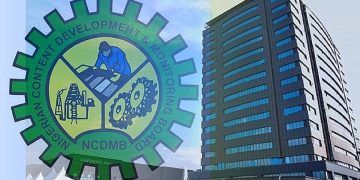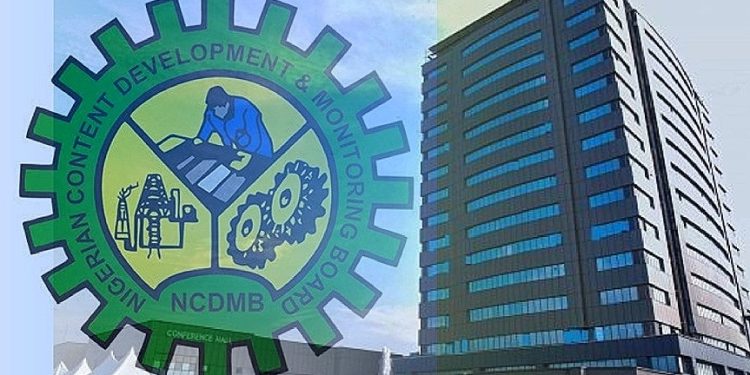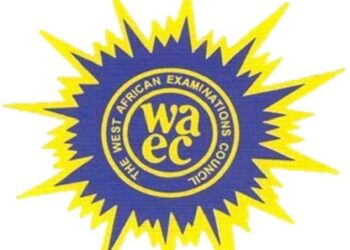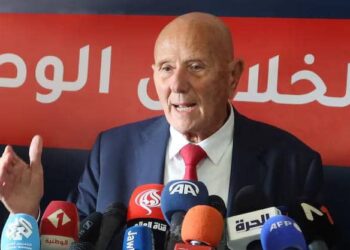By John Ikani
The Nigerian Content performance level in the oil and gas industry has hit 56 percent in 2024, the Executive Secretary, Nigerian Content Development and Monitoring Board (NCDMB), Engr. Felix Omatsola Ogbe announced on Tuesday.
He spoke at the 13th Practical Nigerian Content (PNC) Conference and Exhibition holding at the NCDMB Conference Centre, Yenagoa, Bayelsa State, attended by top government officials including the Deputy Governor of Bayelsa State, Senator Lawrence Ewhrudjakpo, Minister of State for Petroleum Resources (Oil), Senator Heineken Lokpobiri and the Minister of State for Petroleum Resources (Gas), Rt. Hon. Ekperikpe Ekpo.
Other industry leaders in attendance included the Chairperson, Senate Committee on Local Content, Senator Natasha Akpoti-Uduaghan, chairperson, House of Representatives Committee on Nigerian Content Development and Monitoring, Hon. Boma Goodhead, the Secretary General of the African Petroleum Producers Organisation (APPO), Dr. Umar Farouk Ibrahim and chief executives of international and indigenous oil and gas companies and operating and regulatory agencies in the petroleum sector.
The Nigerian Content performance level is calculated on year-on-year basis by the Monitoring and Evaluation Directorate of the NCDMB and is anchored on the ongoing projects in the upstream, midstream and downstream segments of the oil and gas industry.
Data is aggregated from total amounts expended on projects and the Nigerian Content component of the annual spend. The data is mined from statutory reports submitted by companies and the integrity those data is verified during Nigerian Content performance reviews and workshops and they must sync with the Nigerian Content Compliance Certificates (NCCC) on projects approved by the Board.
The Nigerian Content level stood at 54 percent as at December 2022 and 2023, increasing significantly from 26 percent in 2016 before the introduction of the Nigerian Content 10-year strategic roadmap. The latest increase marks a significant milestone in the Board’s march toward 70 percent Nigerian Content by 2027 as set out in its 10-Year Strategic Road Map (2017-2027).
The NCDMB boss also revealed that 312 Nigerian Content Plans have thus far been approved by the Board and that 402 Nigerian Content Compliance Certificates (NCCCs) were issued. Also, that the new Project Certification and Authorisation Directorate (PCAD) guidelines has reduced the Board’s touchpoints from nine to five, and the contracting cycle cut to six months, he confirmed.
Engr. Ogbe and a representative of the Bank of Industry (BoI) used the PNC Forum to sign an agreement on the Revised Nigerian Content Community Contractors Financing Scheme. The Fund addresses a critical challenge faced by local contractors in accessing much-needed funds for contracts awarded by oil and gas companies.
Under the new product paper for the fund, N15 billion has been earmarked for the fund and “the single obligor limit has been increased from N20 million to N100 million,” Ogbe hinted.
On the Nigerian Content Academy recently established by the Board for training to prepare Nigerians through a range of courses that cover every aspect of the oil and gas industry, from upstream exploration to downstream processing, he said new career paths and economic opportunities are being opened for local communities. The Academy was unveiled by the Ministers as part of activities marking the Forum.
The Executive Secretary gave insight into the Back-to-the-Creeks Initiative which focuses on taking Nigerian Content benefits to local communities, especially developing basic educational facilities in communities and equipping youths in host communities with the skills needed to meet industry demands, and thus directly supporting the local content drive.
In his address, the Minister of State for Petroleum Resources (Gas), Rt. Hon. Ekperikpe Ekpo, commended NCDMB for systematically aligning its local content policy initiatives with Federal Government’s gas development agenda.
The Minister listed the NCDMB’s support for compressed natural gas (CNG) projects, modular gas processing plants, manufacturing plants for liquefied petroleum gas (LPG) cylinders, LPG depots, LPG terminals, LPG storage and bottling plants, gas gathering facilities, smart gas and detector alarm services, as critically important areas where the Board’s strategic intervention has made huge gains for the country.
He disclosed that “in the last 12 months, two critical gas projects were completed,” namely, SEPLAT Assa North and Shell Petroleum Development Company (SPDC) Ohaji South, with a combined capacity of 600 million standard cubic feet/day. Also, the 300 MMscfd Kwale Gas Gathering (KGG) Hub and Injection Facility, jointly executed by Xenergy Limited and the NCDMB, were commissioned within the same period.
While reiterating that “gas will be the mainstay of Nigeria’s energy shift” as the world transits to renewables, he stated that Government is “giving local businesses a chance to engage in gas distribution, processing, and power generation.”
With specific reference to the PNC Forum, he said the theme “Defining the Next Frontier for Nigerian Content Implementation” is “a call to action and a reaffirmation of Nigeria’s commitment to leveraging our local capabilities to drive energy security, economic growth, and environment sustainability.”
He charged the organisers of the Forum, namely, NCDMB and DMG Events Limited, to ensure that the event functions as “a spur for practical ideas that move our country closer to a promising and sustainable energy future.”
Also speaking at the event, Minister of State for Petroleum Resources (Oil), Senator Heineken Lokpobiri, commended the NCDMB for organising the Forum and for significant milestones recorded thus far since its establishment in 2010. He revealed that wherever he has been across Africa for oil and gas-related events, other countries want to come to Nigeria to learn from its local content success story.
On divestments by international oil and gas companies (IOCs) in the country, he said there is no reason to be alarmed as indigenous operating companies have adequately filled the gaps and thus significantly increased the country’s stake in the industry. He said the affected IOCs have not left the country but simply moved their investments and operations from onshore to deep offshore.
The Minister urged industry players to be strategic in their thinking, noting that “quality, standards and capacity developed have to be sustained” if the country is to be able to sustain the gains made so far.
With regard to strategies to deal with the decline in funding of oil and gas projects in Africa, in the wake of the global de-emphasis of fossil fuels, the Secretary General of the African Petroleum Producers Organisation (APPO), Dr. Umar Farouk Ibrahim, said the Africa Energy Bank (AEB) would be taking off in the second quarter of 2025, with the signing and ratification of the Establishment Agreement by the required number of countries. Its headquarters is to be located in Abuja.
In his remarks, the Bayelsa State Deputy Governor, Senator Lawrence Ewhrudjakpo, commended the NCDMB and industry stakeholders for putting together the event, and for the collaboration that has yielded remarkable developments in the petroleum industry.
He, however, reminded the industry captains that Bayelsa State accounts for about 60 per cent of the gas feedstock for the Nigeria Liquefied Natural Gas (NLNG) Project, Bonny, which has now progressed to Train 7, and thus deserves to have a train built within its territory.
In the Organiser’s Welcome Address, Mrs Wemimo Oyelana, Country Director (Nigeria) and Portfolio Director (Africa), DMG Nigeria Limited, said the theme of the Forum was “designed to spark forward-looking and transformative discussions,” and that “As the Nigerian energy sector continues to evolve, it is critical to address the next steps in advancing Nigerian Content.”
Other speakers included the Chairperson, Senate Committee on Local Content, Senator Natasha Akpoti-Uduaghan, her counterpart in the House of Representatives, Hon. Boma Goodhead, the Minister of Power, Mr Adebayo Adelabu, the Group Chief Executive Officer of Nigerian National Petroleum Company Limited (NNPCL), Mallam Mele Kyari, Chief Executive Officer of the Nigerian Upstream Petroleum Regulatory Commission (NUPRC), Engr. Gbenga Komolafe, and his Nigerian Midstream and Downstream Petroleum Regulatory Authority (NMDPRA), Engr Farouk Ahmed.
The PNC continues on Wednesday at the Nigerian Content Tower, Yenagoa and ends on Thursday with a visit to First Marine and Engineering Services Limited base in Swali, Yenagoa.

































